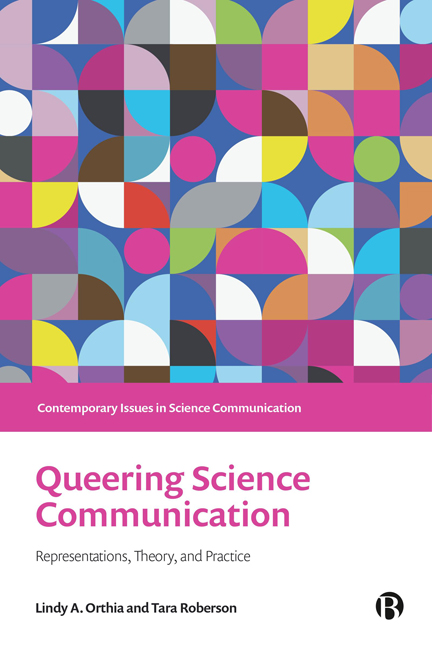Book contents
- Frontmatter
- Contents
- Series Editor Preface
- Notes on Contributors
- Acknowledgements
- Terminology and Sensitive Content in This Book
- Introduction
- PART I Negotiating Queer Identities with Science, Technology, and Medicine
- PART II Representations of Queerness in Public Science Communication
- PART III Queer People in Science Communication Communities
- PART IV Queering Institutional Science Communication Agendas
- Conclusions
- Index
11 - Queering Science Communication Theory Beyond Deficit and Dialogue Binaries
Published online by Cambridge University Press: 18 January 2024
- Frontmatter
- Contents
- Series Editor Preface
- Notes on Contributors
- Acknowledgements
- Terminology and Sensitive Content in This Book
- Introduction
- PART I Negotiating Queer Identities with Science, Technology, and Medicine
- PART II Representations of Queerness in Public Science Communication
- PART III Queer People in Science Communication Communities
- PART IV Queering Institutional Science Communication Agendas
- Conclusions
- Index
Summary
Content warning: this chapter deploys sexual metaphors and discusses Francis Bacon's use of a rape metaphor to promote science in the 17th century.
What might queer perspectives offer science communication theory? In this chapter, inspired by queer theory's metaphorical potential, we challenge the science/public binary that underlies most of the science communication models at the centre of science communication theory. We focus on models because they constitute the most well developed area of science communication theory (Trench and Bucchi, 2010). We argue that queering science communication models offers liberatory possibilities for science communication by undermining the hegemonic authority of Western institutionalized science and by granting epistemic legitimacy to marginalized people, including LGBTIQA+ people.
In the spirit of queer pluralism, we take two simultaneous paths to arrive at that point. The left option takes a straighter academic path and examines two queer case studies that illustrate key problems with science communication models. The right option takes a queerer path, using an extended metaphor to explore the gendered and sexual dimensions of the relationship between science and science communication to show what is in desperate need of change. Choose whichever you prefer to read first, then read the other if you like. The paths come together at the chapter's end for conclusions applicable to both.
Queered science communication models and the role of trust
The participatory model has let us down by purporting to be the solution to disenfranchisement and marginalization, when in fact it polices and even protects those unequal power dynamics. Metaphorically speaking, and to an extent non-metaphorically, science communication is an airless, suburban bunker of oppressive, cisgendered heteronormativity. Like a controlling husband, Western institutionalized science prizes a fundamentalist scepticism characterized by routinely questioning everything. That very act of questioning removes power from marginalized people when they are rendered science's objects.
Dialogue and participation cannot reinstate that power. Rather, they force the marginalized to negotiate truth with an oppressive knowledge system whose adherents think they have something useful to contribute to every question. As far as current models are concerned, science communication's imperatives reinscribe Western institutionalized science's claim that it is the gold standard of authority.
- Type
- Chapter
- Information
- Queering Science CommunicationRepresentations, Theory, and Practice, pp. 191 - 205Publisher: Bristol University PressPrint publication year: 2023

